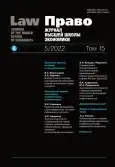The Right to Informational Self-Determination: On the Edge of Public and Private
- Autores: Talapina E.1
-
Afiliações:
- Russian Academy of National Economy and Public Administration under the President of the Russian Federation
- Edição: Volume 15, Nº 5 (2022)
- Páginas: 24-43
- Seção: Russian Law: Condition, Perspectives, Commentaries
- URL: https://journal-vniispk.ru/2072-8166/article/view/318214
- DOI: https://doi.org/10.17323/2072-8166.2022.5.24.43
- ID: 318214
Citar
Texto integral
Resumo
The right to informational self-determination, as the authority of the individual to decide fundamentally for herself, when and within what limits personal data may be disclosed, was formulated by German jurisprudence and has become a model for many States as well as for European Law in general. It is seen as a necessary tool for maintaining a vibrant democracy, on the basis that privacy is an integral part of society. The basis for the judicial decision was the Kantian theory of the moral autonomy of the individual. This explains the close connection of judicial reasoning with human rights and their Public Law protection. At the same time, under Anglo-Saxon influence, a property approach to personal data that may become the object of transactions is developing. The property approach views personal data as a valuable commodity that can be the object of transactions and operations with other people through licenses. In practice, access to personal data has recentlybeen increasingly provided as a counter performance (compensation) to contracts for the provision of digital content and in exchange for personalized services. The study shows that there are many interactions of public and private in the legal protection of data (information self-determination as a subjective public right requires the corresponding obligations of the State to be formalized, there is no unambiguous sectoral qualification of a persons consent to data processing, the insufficiency of the principle of confidentiality by default before the potential for harm is noted). Analysis of the evolution of the data legal protection leads to conclude that the public/private distinction is gradually levelling off. It seems that the problem of the circulation and protection of personal data cannot be solved in a sector framework, but only comprehensively, without violating the traditional logic of public and private. This means that the right to information self-determination, due to its complex nature, can be regarded as a principle that has an inter-branch nature which extends to both the Public Law data protection and the implementation of subjective civil rights in this area.
Palavras-chave
Sobre autores
Elvira Talapina
Russian Academy of National Economy and Public Administration under the President of the Russian Federation
Email: talapina@mail.ru
ORCID ID: 0000-0003-3395-3126
Doctor of Sciences (Law), Doctor of Law (France), Chief Researcher
Bibliografia
- Albers M. (2014) Realizing the complexity of data protection. In: Gutwirth S., Leenes R. et al. (eds.). Reloading data protection: multidisciplinary insights and contemporary challenges. Dordrecht: Springer, pp. 213-235. DOI:https://doi.org/10.1007/978-94-007-7540-4_11
- Arkhipov V.V. (2018) Personal Data as nonmaterial values (or there is nothing more practical than a good theory). Zakon = Statute, no. 2, pp. 52-68 (in Russ.)
- Eberle E. (2012) Observations on the development of human dignity and personality in German constitutional law: an overview. Liverpool Law Review, no. 3, pp. 201-233. DOI:https://doi.org/10.1007/s10991-012-9120-x
- Ernst C. (2020) Artificial intelligence and autonomy: self-determination in the age of automated systems. In: T. Wischmeyer, T. Rademacher (eds.). Regulating artificial intelligence. diam: Springer, pp. 53-74. DOI:https://doi.org/10.1007/978-3-030-32361-5_3
- Habermas Yu. (1995) Democracy. Reason. Moral. Moscow: Academia, 245 p. (in Russ.)
- Marsch N. (2020) Artificial intelligence and the fundamental right to data protection: opening door for technological innovation and innovative protection. In: T. Wischmeyer, T. Rademacher (eds.). Regulating artificial intelligence. Cham: Springer, pp. 33-52. DOI:https://doi.org/10.1007/978-3-030-32361-5_2
- Orrù E. (2017) Minimum Harm by Design: Reworking privacy by design to mitigate the risks of surveillance. In: Leenes R. et al. (eds.). Data protection and privacy: (in)visibilities and infrastructures. Cham: Springer, pp. 107-137. DOI:https://doi.org/10.1007/978-3-319-50796-5_5
- Pokrovskiy I.A. (1998) Main issues of civil law. Moscow: Statut, 353 p. (in Russ.)
- Rouvro A., Poullet Y. (2009) The right to informational self-determination and the value of self-development: reassessing the importance of privacy for democracy, In: Gutwirth S. et al. (eds.) Reinventing Data Protection: Proceedings of the international conference. Dordrecht: Springer, pp. 45-76. DOI:https://doi.org/10.1007/978-1-4020-9498-9_2
- Sattler A. (2018) From personality to property? Revisiting the fundamentals of the protection of personal data. In: Bakhoum M. et al. (eds.) Personal Data in Competition, Consumer Protection and Intellectual Property Law. Towards a Holistic Approach? Heidelberg: Springer, pp. 27-54. DOI:https://doi.org/10.1007/978-3-662-57646-5_3
- Savelyev A.I. (2021) Civil law aspects of commercialization of personal data. Vestnik grazhdanskogo prava = Civil Law Herald, no. 4, pp. 104-129 (in Russ.) DOI:https://doi.org/10.24031/1992-2043-2021-21-4-104-129
- Sergeev A.P., Tereshchenko T.A. (2018) Big data: in search of a place in the civil law system. Zakon = Statute, no. 11, pp. 106-123 (in Russ.)
- Solove D. (2013) Privacy self-management and the consent dilemma. Harvard Law Review, vol. 126, pp. 1880-1903.
- Szekely I., Vissy B. (2017) Exercising access rights in Hungary. In: C. Norris et al. (eds.) The Unaccountable State of Surveillance. Exercising Access Rights in Europe. Cham: Springer, pp. 135-180. DOI:https://doi.org/10.1007/978-3-319-47573-8_7
- Umnova-Konyukhova I.A., Alferova E.V., Aleshkova I.A. (2021) Digital development and human rights. Moscow: INION, 174 p. (in Russ.)
- Vivarelli A. (2020) The crisis of the right to informational self-determination. The Italian Law Journal, vol. 6, no. 1, pp. 301-319.
- Warren S., Brandeis L. (1890) The right to privacy. Harvard Law Review. vol. IV, no. 5, pp. 193-220. DOI:https://doi.org/10.2307/1321160
- Westin A. (1967) Privacy and freedom. New York: Atheneum, 487 p.
Arquivos suplementares








